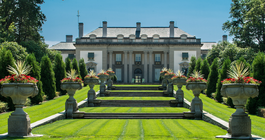
March 09, 2016
The world is full of questions we all want answers to but are either too embarrassed, time-crunched or intimidated to actually ask. In the spirit of that shared experience, we've embarked on a journey to answer all of the questions that burn in the minds of Philadelphians -- everything from universal curiosities (Why do disposable coffee cups still leak?) to Philly-specific musings (How does one clean the Liberty Bell?).
There’s a running idea that hair can be healthy and dead at the same time. How can it be both?
That’s a great question, and a lot of my clients ask that as well. Hair is made up of the same protein as our skin and nails. So although it’s ‘dead,' it’s still very important to take care of your hair. In addition to working for Salon Thalia behind the chair, I also work for Shu Uemura Art of Hair and work with L'Oreal's luxury brands. So as an educator and hairdresser, we know that healthy hair is a reflection of healthy skin. So although the actual compound of hair may be dead, there’s still definitely a gradient of the type of hair people have. So whether it be dry, or fine or frizzy, there are lots of ways you can address having healthy skin that can then, in turn, have healthy hair.
So we encourage our clients to use the products we sell and [explain] that the science behind the production of our shampoos and conditioners focuses on healthy skin as well, not just healthy hair.
What characterizes 'healthy hair' in this scenario?
I would definitely say first and foremost is moisture. Most people have dry hair or dry scalp. Oftentimes, clients have overactive sebaceous glands when the hair is very oily, and I feel there are a lot of products on the market that really strip the moisture from the scalp and also can strip the moisture from the hair. Biologically, we have hair to protect our scalp, and eyelashes to protect our eyes, and it holds moisture from the scalp or wherever. But also, in the cosmetic industry, hair is an accessory. Having dull, lifeless hair, or whatever the hair challenge may be, we’ve gone through in cosmetics to either add moisture back into the hair for people who color-treat their hair …
And I think environmental stress is a factor as well. Maybe you live in Philadelphia and there’s lots of pollution. And the bus drives by and blows dust all over you. People smoke cigarettes and are outside a lot and are exposed to different elements. We use products to help hair get back to a natural state [of youth]. Most of us don’t have hair that was like it was when we were a child before we took it through our lifestyle.
Is there ever a point where hair is 'alive'?
Hair is dead protein cells, so no. It's not alive. There are no live nerves in the hair -- only at the follicle where the hair attaches to the head. That doesn't mean that we should not take care of it. Hair should be cared for through proper maintenance. Challenges such as dryness, split ends, fried, dull, limp and fine density can all be addressed through proper hair care.
But a lot of it has to do with diet too, right?
Absolutely. Hair, our scalp, is very reflective of lifestyle. People who have higher mineral intake and vitamins and a healthier lifestyle are going to have that reflected in their hair, as opposed to someone who may have a poor lifestyle. You see people walking around the city and you can tell if someone is taking care of their skin. It’s a living organ, but there are dead skin cells, and sometimes you can see that in the color of the skin, the texture of the skin, as opposed to when you see someone who their skin may be bright ...
If you’re taking care of yourself, your hair is going to reflect that, just like your skin would.
What makes hair lose these 'healthy' qualities, like proteins and lipids, in the first place?
Time, treatment, age, nutrition. For example, most of us are not walking out with natural hair color – I'd say 50 percent of men do or do not color their hair, whereas women color their hair much more ...
I’d say the majority of our clientele are covered in gray and getting a chemical highlight. So, that chemical process of opening up the cuticles of the hair, taking melanin out -- color out -- and putting color back in. That whole process, interrupting your cuticles of the hair [does damage]. Same thing with highlights in blond hair. Blond hair is the absence of color. You’re opening up the cuticles of the hair, taking color out, so what you’re left with is blonde. That’s what blonde is – absence of color. That process of opening the cuticle up and closing it back down is where proper products come into place.
So, coloring your hair or even styling your hair, maybe. Most guys aren’t brown-brushing their hair, but maybe they do flat iron their hair, maybe blow-dry it back. Heat can hurt hair. Irons, brown brushes, curling irons -- all those things that we do to get our hair aesthetically how we want it can damage the hair, which is why there's such a large billion-dollar industry in haircare and making hair as healthy as possible.